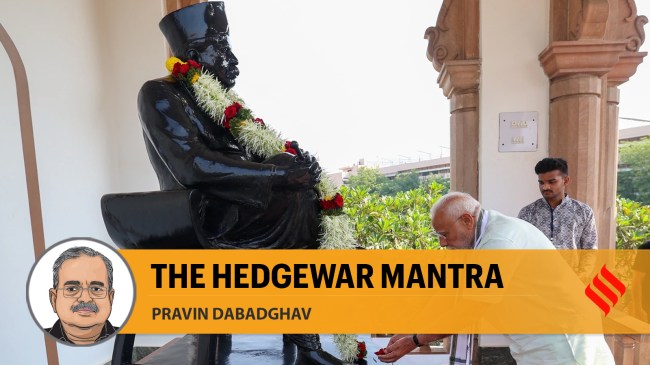Opinion The man behind the RSS: Why K B Hedgewar remains relevant
Hedgewar had profound clarity about the RSS’s work culture. As the RSS reaches its 100th year, his vision remains deeply relevant today
 Nagpur: Prime Minister Narendra Modi pays tribute to RSS founder KB Hedgewar at his memorial, in Nagpur, Sunday, March 30, 2025. RSS chief Mohan Bhagwat is also seen. (PTI Photo)
Nagpur: Prime Minister Narendra Modi pays tribute to RSS founder KB Hedgewar at his memorial, in Nagpur, Sunday, March 30, 2025. RSS chief Mohan Bhagwat is also seen. (PTI Photo) Written by Pravin Dabadghav
This year’s Vijayadashami marks the centenary of the Rashtriya Swayamsevak Sangh (RSS). Gudi Padwa, which coincides with the birthday of Keshav Baliram Hedgewar, the founder of the RSS, holds special significance. One of the most defining aspects of Hedgewar’s legacy is the “Sangh Mantra” he shared with thousands of swayamsevaks, which continues to shape the path of the organisation.
Hedgewar’s personality is defined by several remarkable qualities, two of the most notable being his unwavering patriotism and exceptional organisational skills.
Hedgewar was born on April 1, 1889, in Nagpur. From a young age, he was driven by a desire to free India from British colonial rule. As a 16-year-old, he formed a group with his peers, reading newspapers such as Kaal, Kesari, Bhala, and Amrit Bazaar Patrika. At the same time, he was involved in the sale and distribution of indigenous (swadeshi) goods through a centre run by the Swadeshi Bandhav group. Hedgewar was a vocal advocate for India’s freedom, famously chanting “Vande Mataram” at a Dussehra procession at Rampayali, where he also delivered a passionate speech. For this, he was expelled from school. After joining a private institution and completing his matriculation, he moved to Kolkata in 1910 to pursue medical studies.
Kolkata, a hub of revolutionary activity at the time, offered Hedgewar an opportunity to engage directly with the independence movement and understand the strategies of the struggle. He returned to Nagpur in 1916 after completing his medical education and became involved in social work. He assisted in organising volunteers at the Nagpur Congress session in 1920.
Hedgewar joined the Non-Cooperation Movement launched by the Congress against British rule. His impassioned speeches led to his arrest in May 1921. In 1923-24, he began publishing Swatanya, the first daily newspaper in the Central Provinces and Berar, with the support of his colleagues.
In 1930, Mahatma Gandhi called for civil disobedience, and Hedgewar participated in the Forest Satyagraha in Vidarbha, following Gandhi’s Salt Satyagraha. On July 21, 1930, he led a Satyagraha in the Lohara forest near Yavatmal, where thousands of citizens gathered to witness the protest. He was arrested and sentenced that same day. By this time, the RSS had already begun its work.
Hedgewar constantly reflected on the state of the country. He was troubled by the reality that a small group of Englishmen could dominate a vast nation like India. The root cause, he concluded, was the disorganisation and disunity within Indian society, particularly among Hindus. To counter this, Hedgewar envisioned an awakened and well-organised Hindu society. After much contemplation, he founded the Rashtriya Swayamsevak Sangh on Vijayadashami, September 27, 1925.
For many years after its inception, people struggled to understand the RSS’s mission. The organisation faced criticism, with some questioning its relevance and accusing it of wasting energy by gathering youth for physical training. Over time, the impact of the RSS became evident. The number of shakhas, swayamsevaks, workers, and pracharaks grew exponentially.
Hedgewar’s vision was simple but powerful: Swayamsevaks would gather at shakhas for an hour each day, engaging in physical exercises, games, and drills to strengthen their bodies and develop discipline. The goal was not only to foster physical fitness but to cultivate a sense of patriotism, social responsibility, and devotion to the welfare of society. This was the essence of the “Sangh Mantra”. Today, the RSS runs more than 89,000 service projects across the country, demonstrating the vast scope and profound impact of its work.
In a letter to swayamsevaks written on May 2, 1935, in Sangli, Hedgewar wrote: “We have undertaken the great responsibility of national work. The high goal of the RSS must be proven through real practice, and we must demonstrate to people that principles must be put into action… Discipline is the foundation of our organisation, and it is upon this foundation that we must build our immense structure.”
Clearly, Hedgewar had profound clarity about the RSS’s work culture. As the RSS reaches its 100th year, his vision remains deeply relevant in today’s world. The RSS’s commitment to environmental awareness (paryavaran) resonates today as sustainability becomes a global priority. Hedgewar’s advocacy of self-reliance (swabodh) encourages individuals and communities to become self-sufficient, countering the global over-dependence on external resources and fostering economic resilience. The promotion of kutumb prabodhan (family values) is also timely in addressing the challenges faced by modern family structures. Finally, his focus on nagari shishtachar (civic sense and duty) is crucial in a world where ethical behaviour and social responsibility are often sidelined.
Economically, Hedgewar championed the concept of self-reliance or Swadeshi, urging individuals and communities to take pride in indigenous industries and practices. This idea has regained substantial relevance today, as economies worldwide grapple with supply chain vulnerabilities and excessive reliance on external sources for basic goods and services.
The RSS, through its century-long journey, continues to stand as a testament to the practical application of his ideas. Hedgewar’s vision remains an essential guiding force in addressing the challenges of today’s world.
The writer is the prant karyavah of the Rashtriya Swayamsevak Sangh, Paschim Maharashtra Prant



